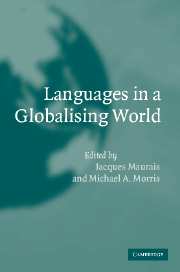Book contents
- Frontmatter
- Contents
- List of figures
- List of tables
- Notes on contributors
- Acknowledgements
- 1 Introduction
- Part I Global communication challenges
- Part II Major areas
- Part III Languages of wider communication
- 15 The international standing of the German language
- 16 Arabic and the new technologies
- 17 Russian in the modern world
- 18 Geolinguistics, geopolitics, geostrategy: The case of French
- 19 Towards a scientific geostrategy for English
- 20 On Brazilian Portuguese in Latin American integration
- Conclusion
- Index
17 - Russian in the modern world
Published online by Cambridge University Press: 18 November 2009
- Frontmatter
- Contents
- List of figures
- List of tables
- Notes on contributors
- Acknowledgements
- 1 Introduction
- Part I Global communication challenges
- Part II Major areas
- Part III Languages of wider communication
- 15 The international standing of the German language
- 16 Arabic and the new technologies
- 17 Russian in the modern world
- 18 Geolinguistics, geopolitics, geostrategy: The case of French
- 19 Towards a scientific geostrategy for English
- 20 On Brazilian Portuguese in Latin American integration
- Conclusion
- Index
Summary
When speaking about any kind of space (economic, cultural, ecological, etc.), scholars often rely on the geographical location of phenomena distributed widely inside the borders of a country and adjoining territories, to include one large area according to some classifying (e.g. functional) feature or features. We therefore think it constructive to introduce the term ‘language space’ into sociolinguistic research, in order to define a complex phenomenon: the functional performance of a language. The notion of language space, therefore, includes both geographical and functional dimensions of language. Languages with restricted social functions (e.g. some minority languages) have narrower geographical space, since their functional space is usually more homogenous, and, at the same time, restricted to the territory where their native speakers are located. The geographical space of functionally developed languages, such as Russian, is heterogeneous.
The repertoire of the social functions of Russian can be described as follows:
national language of the Russian Federation;
ethnic language of Russians;
mother tongue of some non-Russians within the Russian Federation and the CIS (Commonwealth of the Independent States, the association of countries that emerged after the disintegration of the USSR);
mother tongue of Russian-speaking communities in different regions of the world;
common means of interethnic communication in the Russian Federation;
one of the languages of interethnic communication in the countries of the CIS;
!!!a means of international communication between the countries of the CIS;
one of the international languages as acknowledged by the UN and UNESCO.
- Type
- Chapter
- Information
- Languages in a Globalising World , pp. 260 - 290Publisher: Cambridge University PressPrint publication year: 2003
- 2
- Cited by



